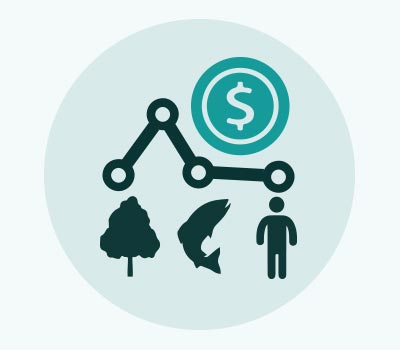Economic Assessment
Economic assessment is an integral part of environmental decision-making, but coupling economics with biophysical processes is a complex task.
 Applying an economic lens can assist in evaluating risks, understanding benefits and costs from competing management pathways, assessing public preferences, and developing business cases for addressing environmental problems. It can also aid in communicating decisions using monetary value as a single, easily understood metric. However, limited dialogue between economists, ecologists and decision-makers often leads to questionable or impractical economic outputs.
Applying an economic lens can assist in evaluating risks, understanding benefits and costs from competing management pathways, assessing public preferences, and developing business cases for addressing environmental problems. It can also aid in communicating decisions using monetary value as a single, easily understood metric. However, limited dialogue between economists, ecologists and decision-makers often leads to questionable or impractical economic outputs.
Achieving useful economic assessment in an environmental context requires a unique ability to bridge across disciplines. When this cross-talk is fostered effectively, it leverages the best of all relevant areas of expertise to produce robust decision support tools. The result is better environmental choices that are more easily implemented and backed by scientifically sound methods.
ESSA’s expertise in biophysical systems, decision analysis, geospatial analysis, and technical facilitation, combined with interdisciplinary training in environmental economics, situate us as an ideal bridging agent to provide economic services. Whether incorporating the value of ecosystem services into economic decision support tools, evaluating the utility of different economic policy instruments, or developing a baseline with well-specified indicators, we ground economic assessment in rigorous, science-based approaches that will help you make good decisions your audience will support.
Our services in this space include:
- synthesis and policy evaluation including assessment of economic policy instruments for environmental management priorities like climate change adaptation and disaster risk management
- economic decision analysis using methods such as marginal benefits or costs estimation, full cost-benefit analysis, cost-effectiveness analysis, economic impact assessment, and multiple accounts analysis
- bio-economic modelling, harnessing our extensive expertise in modelling of biophysical systems and model coupling to express scientifically rigorous outputs in economic terms
- ecosystem services valuation using a variety of market and non-market approaches including discrete choice experiments, benefit transfer, replacement costs, foregone benefits, direct benefits/costs, avoided costs, and revealed preference methods
- development of conservation financing portfolios by helping clients identify which combinations of conservation financing options best meet their interests given the range of natural assets in their land holdings
- natural asset marketing plans to increase awareness of our client’s natural assets and the services they provide, and outline priority steps required to bring those assets to market in different credit trading systems
Key projects showcasing these services:
- Baseline Spatial Model of Marine Ecosystem Services in BC’s Northern Shelf Bioregion (FLNRORD for the Marine Protected Areas Technical Team)
- Economic Valuation of Old-growth Forests on Vancouver Island (Ancient Forest Alliance)
- Learning about the GreenShores Program – Triple Bottom Line Socio-economic Evaluation (The Stewardship Centre for BC)
- Coordinating Costs of Climate Change in Canada (Canadian Institute for Climate Choices)
- Improving Fisheries Governance and Management in the Eastern Caribbean – Cost-benefit Analysis Component (World Bank)
- Economic Value of Storm Surge Protection from Coastal Natural Assets (David Suzuki Foundation with the Municipal Natural Assets Initiative)
- Economic Value of Stormwater Protection from Natural Assets in Gibsons, BC (Municipal Natural Assets Initiative)
- Economic State of Play for Climate Change Adaptation in Canada (PricewaterhouseCoopers Canada LLP)
- Preliminary Damage Estimates for Selected Invasive Fauna in BC (BC Ministry of Environment)
- Economic Impacts of Invasive Plants in BC (Invasive Plant Council of BC)
- Arrow Lakes Recreational Survey of Angler Preferences (BC Ministry of Forests, Lands and Natural Resource Operation)
- Economic Valuation of Salmon in Barkley Sound (Gardner Pinfold Consulting)
